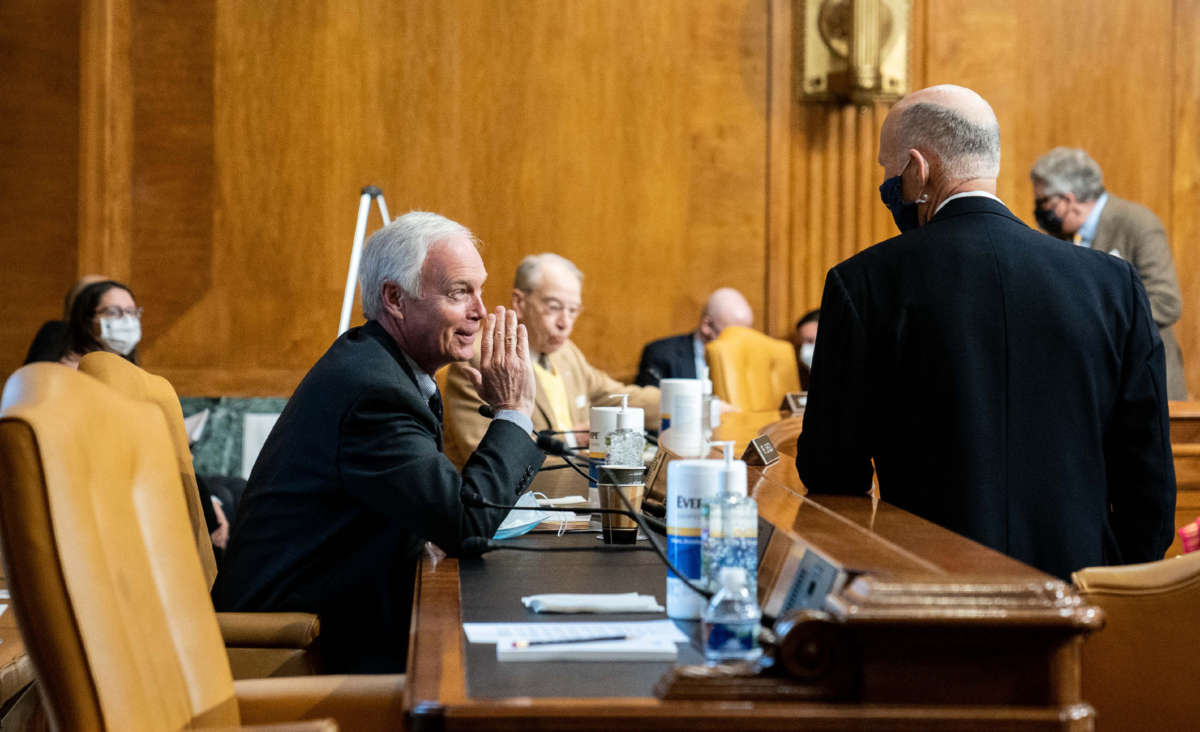Honest, paywall-free news is rare. Please support our boldly independent journalism with a donation of any size.
As national and global vaccination rates continue to rise, one place that has long had access to COVID-19 vaccines is hitting an unexpected roadblock to reaching a higher threshold of immunity: the United States Congress.
Members of the House of Representatives were first offered the coronavirus vaccine back in December 2020. With only 435 lawmakers in the chamber, it should have been easy to achieve a nearly 100-percent rate of vaccination within the House.
Public health officials have supported full vaccination of Congress as an important goal, as it may change the minds of reluctant Americans across the country. As a recent NPR/PBS NewsHour/Marist poll has demonstrated, 41 percent of GOP voters across the country say they will not get the vaccine — compared to 30 percent of the general population.
However, fully one-quarter of the House has not yet received the vaccination, reporting from Axios has detailed.
There are a few mundane explanations. Some of those lawmakers may have not updated their vaccination status. Others could have health complications that prevent them from being vaccinated for the coronavirus or from receiving vaccinations in general.
However, some Republican lawmakers simply refuse to get the vaccine.
“I won’t be taking it. The survival rate is too high for me to want it,” Rep. Madison Cawthorne (R-North Carolina) said in December, despite Congressional testimony from Anthony Fauci, the nation’s top infectious diseases expert, explaining that COVID-19 is “10-times more lethal than the seasonal flu.”
“I have the freedom to decide if I’m going to take a vaccine or not and in this case I am not going to take the vaccine,” Rep. Ken Buck (R-Colorado) also said in December.
Buck’s comments on the vaccine may have also worked to have spread misinformation about it. “I’m more concerned about the safety of the vaccine than I am the side effects of the disease,” Buck said, in spite of several documented studies that show the coronavirus vaccine is safe.
The misinformation about COVID-19 and the vaccine to prevent its spread isn’t limited to the House — over in the Senate, too, there are Republicans who are spreading lies.
Sen. Ron Johnson (R-Wisconsin) was recently interviewed about whether he would get the vaccine. Johnson, who contracted coronavirus last fall, wrongly said his infection was sufficient to ensure future immunity.
.@SenRonJohnson tells me he doesn't believe he needs the vaccine since he already was diagnosed with COVID-19 last fall.
"No I had COVID, so I don’t believe…I think that probably provides me the best immunity possible actually having the disease.” pic.twitter.com/6VtbbXcsVW— Emilee Fannon (@Emilee_Fannon) March 10, 2021
“I had COVID. I think that probably provides me the best immunity possible, actually having had the disease,” Johnson said earlier this month.
In fact, the Centers for Disease Control and Prevention recommends that everyone who is able get the vaccine, including individuals who have already had the virus in their systems, because there is a rare but possible chance to get reinfected with COVID-19.
Rep. Mark Pocan (D-Wisconsin) wasn’t having it.
“Attention @SenRonJohnson. You need to get vaccinated to be safe for others around you,” Pocan tweeted a couple of days after Johnson’s interview. “Less conspiracy theories, more vaccines and science please.”
Former President Donald Trump has also received criticism for not doing more to push for vaccines. Trump received his vaccination for coronavirus prior to leaving the White House. However, he did so in secret, refusing to publicize it despite other former presidents who had in order to promote the vaccine’s use.
Many, including Fauci, have since called on Trump to encourage his supporters (47 percent of whom say they won’t get vaccinated, per the NPR/PBS NewsHour/Marist poll) to get inoculated.
“How such a large proportion of a certain group of people would not want to get vaccinated merely because of political consideration, it makes absolutely no sense,” Fauci said on “Meet the Press” this weekend.
Trump is silencing political dissent. We appeal for your support.
Progressive nonprofits are the latest target caught in Trump’s crosshairs. With the aim of eliminating political opposition, Trump and his sycophants are working to curb government funding, constrain private foundations, and even cut tax-exempt status from organizations he dislikes.
We’re concerned, because Truthout is not immune to such bad-faith attacks.
We can only resist Trump’s attacks by cultivating a strong base of support. The right-wing mediasphere is funded comfortably by billionaire owners and venture capitalist philanthropists. At Truthout, we have you.
Our fundraising campaign is over, but we fell a bit short and still need your help. Please take a meaningful action in the fight against authoritarianism: make a one-time or monthly donation to Truthout. If you have the means, please dig deep.
